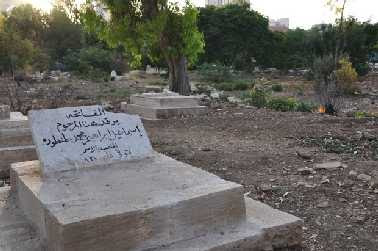Sunday, July 17, 2011
Israel To Build
“Museum of Tolerance” Atop Of Muslim Cemetery
 Mamilla Cemetery after the razing of 100 grave markers.
Mamilla Cemetery after the razing of 100 grave markers.July 16, 2011
Despite widespread opposition, the Ministry of Interior has provided Jerusalem with the final go ahead to build the "Museum of Tolerance" on top of Mamilla Cemetery.
On the night of 26 June, Mamilla Cemetery–Jerusalem’s oldest, most revered, Muslim resting place—was cleared by bulldozers, demolishing nearly 100 grave markers. On Tuesday, 12 July, 16 days after the razing, the Ministry of Interior approved the final permit to build the controversial American Simon Wiesenthal Museum of Tolerance.
The battle over the location of the museum started in 2007. Palestinian activists, local NGOs and international organizations have protested against the blatant disregard for the Muslim holy site. In 2007, the Special Rapporteur on Freedom of Religion and Belief denounced lack of legal protection of non-Jewish sites in Israel.
Dyala Husseini whose family members are buried at Mamilla decried the action.
"It’s shameful that the interests of the Zionist State of Israel bury the historic fact of Mamilla," says Husseini.
International voices have also condemned the plan. In February 2010, the New York-based Center for Constitutional Rights (CCR) appealed to the United Nations to halt the proceedings. In 2009, 1,500 graves were unearthed to begin making room for the museum. In August 2010, approximately 150 tombs and grave-markers were torn down.
Nevertheless, the plan has been pushed through. CCR maintains the destruction of the Mamilla Cemetery is a direct violation of the descendants’ international human right to be free from discrimination, to manifest religious beliefs, and to have their cultural heritage protected.
"The desecration is but one aspect of Israel’s discrimination against Palestinians and disrespect for their cultural heritage," Maria LaHood, the acting legal director of CCR, wrote to The Palestine Monitor in an email interview.
The history of Mamilla Cemetery
Mamilla has served as a Muslim burial ground since the seventh century. Reputed to contain the tombs of companions of the Prophet Muhammadand soldiers of Saladin, the Muslim ruler who seized Palestine from the hands of the Crusaders in the 12th century.
Mamilla’s historical and religious significance had been recognized under Israeli and British Mandate control. In 1927, Mamilla was declared a historical site by the Supreme Muslim Council. In 1948, soon after the new State of Israel seized the western part of Jerusalem, where Mamilla is located, the Israeli Religious Affairs Ministry acknowledged the importance to the Muslim community. In 1986, Israeli authorities included Mamilla Cemetery on the list of "Special Antiquities Sites" in Jerusalem.
Director at the Center for Jerusalem studies, Huda Al-Imam, works to preserve Palestinian culture and heritage in the Old city of Jerusalem. She finds the clearing of the cemetery reprehensible.
"This is part of our heritage and history and the destruction deletes our identity and culture," says Al-Imam, showing The Palestine Monitor the ruins of the ancient burial ground. Al-Imam believes the presence of Palestinians in Jerusalem is threatened and Mamilla Cemetery is one of many clearings of Palestinian intuitions.

